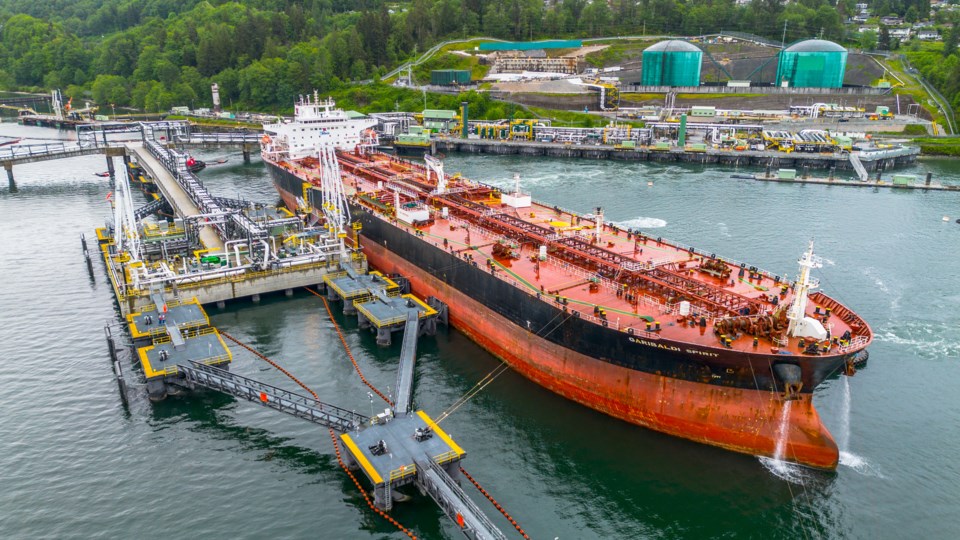The B.C. government has thrown its support behind a proposal to dredge Burrard Inlet to allow oil tankers to fill up from the Trans Mountain pipeline and still fit under the Second Narrows Bridge.
Energy Minister Adrian Dix said the idea, most recently advanced by Prime Minister Mark Carney in March, would utilize the additional capacity of the newly expanded pipeline, which transports diluted bitumen and refined oil products from Alberta to the Westridge Marine Terminal in Burnaby.
“Broadly, the premier and us have indicated our support for it,” Dix said in an interview.
Currently, the largest ships that can be accommodated at the Burnaby terminal are Aframax tankers. But they can’t be filled to their maximum capacity of almost 600,000 barrels of oil, due to the weight of the ship then striking the bottom of Burrard Inlet.
Dix argued there would be fewer tankers overall if existing ones were filled to capacity. However, the proposal is also likely to produce renewed concern from environmental advocates and local officials worried about the impact of a tanker crash and oil leakage in local waterways — something the BC NDP government had expressed concern about in the past as well.
Trans Mountain is looking to increase the volume of its shipments, including the possibility of dredging under the Second Narrows bridge, the Financial Post .
Carney also cited on March 21 his desire to see Canadian port upgrades including “the Second Narrows in British Columbia, which frees up additional exports.”
“We don’t have any objection in principle to that,” said Dix. “If it meets all the other standards, it seems like an idea that makes sense.”
Still, it’s a notable change in tone from the BC NDP government, which had strong opposition to the initial TMX expansion after forming government in 2017. Then-premier John Horgan at the time promised to use every tool at his disposal to block the pipeline, including legal challenges and legislation.
Ultimately, Horgan’s opposition spooked then-pipeline owner Kinder Morgan into selling the project to the federal government, at which point the price tag for twinning the pipeline ballooned from almost $8 billion to $34 billion.
Dix said he’s not interested in re-litigating the merits of the TMX expansion, which was completed in early 2024. Instead, he said the goal now is to not let the pipeline’s capacity go to waste.
“The idea that we would spend, as a country, $34 billion or whatever it is on the project, and not be able to use it to its full extent is a problem,” he said.
“So they'll go through their own process. It'll be a federal initiative, because it's a port, right? But I don't see anything in principle that we would be against there.”
Opposition BC Conservative critic Gavin Dew said Dix has made the right decision, and the tankers need to be fully utilized. But he also noted the irony in that it was Dix who as BC NDP leader in 2013 lost a provincial election, in part, due to his last-minute decision to oppose the Trans Mountain pipeline expansion.
“They tried to stop this project, and because of that, we actually are now in a situation where our access to markets is less than it could have been, investment is less than it could have been,” said Dew.
“So you have a government that literally went from blocking trade diversification over eight years, to now being a government that said it's in favor of the resource sector and trade diversification, which is widely hypocritical in my mind.”
The BC Greens, which are currently in a confidence agreement with the NDP, expressed surprise at the government position, which it did not learn about until Dew began asking questions of Dix in the legislature.
“I hadn’t even heard about this until Gavin Dew asked in estimates,” said Green MLA Jeremy Valeriote. “And I was a little bit surprised by the answer.”
Valeriote said he wants to hear more from the federal government and the province on the exact dredging proposal and what it would involve. And he said the Tsleil-Waututh Nation would need to be brought into the conversation as well.
Dix said it will be up to the federal government to advance the proposal, produce the plan and approach the province for participation.
Rob Shaw has spent more than 17 years covering B.C. politics, now reporting for CHEK News and writing for Glacier Media. He is the co-author of the national bestselling book A Matter of Confidence, host of the weekly podcast Political Capital, and a regular guest on CBC Radio.
[email protected]
🚨New newsletter alert! Stay ahead of the curve in B.C. politics. Get expert political analysis delivered straight to your inbox, plus inside scoops and other stories from across the province.



